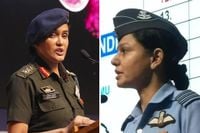On May 7, 2025, two women officers from the Indian Armed Forces took center stage during a press briefing about Operation Sindoor, a significant retaliatory strike against terror camps in Pakistan. Colonel Sofia Quraishi, a member of the Indian Army's Signal Corps, and Wing Commander Vyomika Singh, a helicopter pilot in the Indian Air Force, represented a powerful message of empowerment and resilience.
Colonel Quraishi, who has made history as the first Indian woman officer to lead a contingent at a multinational military exercise, spoke confidently about the operation's details following an initial statement from Foreign Secretary Vikram Misri. This operation targeted nine terror sites in Pakistan and Pakistan-Occupied Kashmir in response to the Pahalgam attack that left 26 Indian civilians dead.
The selection of these two women as spokespersons for the Indian Armed Forces was part of a broader communication strategy, signaling that women are at the forefront of national defense and security. The operation was seen as a direct response to the terror attack that occurred on April 22, 2025, which had particularly devastated families, including those of the deceased men who left behind widows.
Wing Commander Singh, who joined the Indian Army in 2004 and has logged over 2,500 flying hours, addressed the media in English, further reinforcing the significance of women's roles in the military. The choice of these two women officers to lead the briefing was not merely symbolic; it was a statement that women in India are breaking barriers and leading in critical areas.
"This isn’t just a briefing; it’s a bold declaration. Our women lead from the front, in every battle, every mission," said former Union Minister Rajeev Chandrasekhar, reflecting the sentiments shared across political lines on social media.
The operation itself, dubbed Operation Sindoor, was described as the largest retaliatory strike since the Balakot airstrikes. The strikes were executed with precision, and Colonel Quraishi emphasized that no military installations were targeted and that there were no reports of civilian casualties in Pakistan. The operation aimed to send a clear message: India will not tolerate terrorism that threatens its sovereignty and security.
Colonel Quraishi, born in 1981 in Gujarat, comes from a military family and holds a master’s degree in biochemistry. She was commissioned into the Indian Army in 1999 and became the first woman to lead an army contingent at the ASEAN Plus military exercises in 2016. Her presence at the briefing highlighted not only her professional capabilities but also the inclusivity of women and minorities in the Indian military.
"For young Indian girls, especially those from minority communities, her presence on that stage proved that the path to leadership is open, possible, and respected," noted a social media user, echoing the sentiments of many who viewed the event as a turning point for representation in the armed forces.
Wing Commander Singh, who has also been recognized for her bravery during flood relief operations in northeastern India, shared her journey to becoming a pilot during a panel discussion last year. Her story serves as an inspiration for aspiring aviators and military personnel across the country.
The briefing was not just a military update; it was a moment that showcased the strength and resolve of women in the face of adversity. Political leaders and citizens alike praised the decision to have Colonel Quraishi and Wing Commander Singh represent the armed forces, with many seeing it as a reflection of India's commitment to gender equality.
In a time when some voices claim that minorities are unsafe in India, Colonel Quraishi's leadership stood as a counter-narrative, demonstrating that the Indian Armed Forces are open to all who wish to serve, regardless of their background. Her role in the briefing was a testament to the changing dynamics within the military and society.
As social media buzzed with reactions, many highlighted the significance of having two officers of different faiths—one Hindu and one Muslim—leading the narrative. This was seen as a powerful message against divisive tactics employed by terrorists, who sought to create communal discord following the Pahalgam attack.
Colonel Quraishi and Wing Commander Singh's presence at the briefing not only reinforced the operational success of Operation Sindoor but also served to inspire a new generation of women leaders in India. Their roles in the military highlight that service to the nation transcends religion and gender.
Operation Sindoor itself was a calculated response to the Pahalgam attack, which was described as the most significant assault on Indian civilians since the 2008 Mumbai attacks. The Indian government characterized the attack as an attempt to disrupt tourism and development in Jammu and Kashmir and provoke communal riots within the country.
Foreign Secretary Vikram Misri identified the terrorist organization 'The Resistance Front' (TRF) as instrumental in the attack, linking it to groups like Lashkar-e-Taiba (LeT) and Jaish-e-Mohammad (JeM). He emphasized that Pakistan has a history of harboring such groups, and the Indian government remains steadfast in its commitment to neutralizing these threats.
The operation's execution and the subsequent media briefing underscore India's strategic approach to counter-terrorism, combining military action with a narrative of empowerment and unity. As the nation moves forward, the roles of women like Colonel Quraishi and Wing Commander Singh will undoubtedly shape the future of the Indian Armed Forces.
In a world increasingly aware of the importance of representation, the actions taken by these two women officers resonate far beyond the confines of military operations. They serve as a reminder that strength comes in many forms, and leadership can emerge from the most unexpected places.






